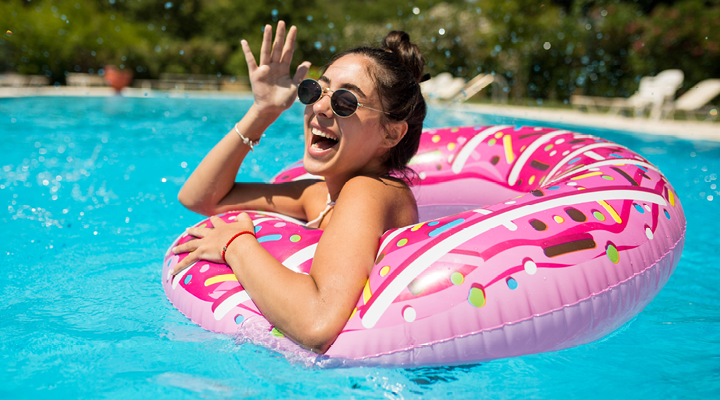*Updated July 2025
Summertime typically means plenty of pool days. While splashing, doing cannonballs, or getting a workout in at the lap lane, it’s easy to forget to protect your eyes while you’re in the water.
Discover some of the best ways to keep them healthy and safe while enjoying the pool!
The dangers of pool water to the eyes
If you take a quick glance at people around a busy pool, you will likely notice red, irritated eyes. Why does this happen? Most of the time, the culprit is chemicals that are in the pool water.
One of the most common chemicals is chlorine. Chlorine works as a disinfectant that helps to kill viruses and bacteria that can make you sick, which is a reason why it’s used in public pools. Unfortunately, chlorine can also lead to eye irritation. According to the Cleveland Clinic, the chemical may lead to teary, red, and sensitive eyes after enjoying time in a chlorinated pool or water park.
Although chlorine does a great job of keeping water clean, it also doesn’t eliminate everything. Bacteria and viruses that aren’t killed by chlorine, like those that cause pink eye, can still be lurking. People who wear contact lenses in the water or have small cuts on their eyeballs are potentially more susceptible to infections from these bacteria and viruses as well.
How to protect your eyes at the pool
The good news is that there are many ways you can protect your eyes at the pool. Here are some tips:
Wear goggles while swimming
If you’re in the water a lot, it’s a smart idea to invest in good goggles to wear in the pool. Swim goggles work by reducing exposure to chemicals in the pool and protecting the eyes from surprise splashes. Adults and kids should consider wearing goggles anytime they’re in the water.
It’s important to find goggles that fit your head and face correctly to prevent any water leakage or, on the flip side, from being too tight. Try to find goggles that can be easily adjusted as needed and are comfortable around the eyes and on top of the nose.
Avoid faces during a splash fight
If splash fights are a common occurrence at the pool, make sure participants avoid splashing the eyes and faces of their opponents. It’s not always as fun, but serious splashing can cause eye injuries. This is because splashes are essentially streams of water that can hit the eyes at high speeds.
With enough speed, the impact of these streams can lead to eye irritation in minor cases or more serious injuries such as lens dislocation or hyphema, which is the pooling of blood in the eye. Wearing goggles during splash fights can easily help protect your eyes.
Rinse your eyes out after a day at the pool
Another way to protect your eyes after a day at the pool is to rinse them out with fresh, clean water or even a saline solution. This will help flush the chemicals and other irritants out of the eyes, and it can reduce eye irritation. It’s important to do this soon after getting out of the water to stop chemicals from staying on your eyeballs too long.
According to the Cleveland Clinic, the following steps should be taken to flush eyes out correctly:
- Start with clean hands. Make sure to wash your hands with soap and water and dry them before starting.
- Take out any contact lenses prior to rinsing.
- Flush your eyes with a gentle stream of clean water or saline solution. Do your best to keep them open as much as possible.
- Continue to rinse your eyes for up to 15 minutes, as needed.
Another option is to rinse your eyes out in the shower. While you might think this means looking directly into the stream, the correct way to do it is to let the water hit your forehead and run onto your eyes.
Always wear sunglasses to protect your eyes
Wearing sunglasses both in and out of the pool is a great way to protect your eyes from harmful ultraviolet rays. Sunlight reflected off of the water can lead to photokeratitis, or a sunburn on the corneas of the eyes. Wearing sunglasses that have 99 to 100 percent UV ray absorption will help protect your eyes. If you don’t want to wear sunglasses in the pool, consider swim goggles with UV protection.
For more ways to protect your eyes and vision from UV exposure, check out this blog.
Protecting your eyes at the pool is important
Taking care of your eyes is important, especially when you’re enjoying time at the pool. Don’t let eye problems ruin your summer fun!
If you do end up with an eye injury or infection, it’s important to see an eye doctor as soon as possible. Vision insurance like DeltaVision® makes it easy to find an optometrist or ophthalmologist near you.
To learn more about vision insurance, check out “How to Make the Most of Your Vision Insurance Benefits Before Year-End.”

